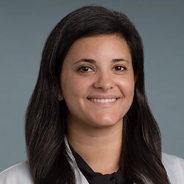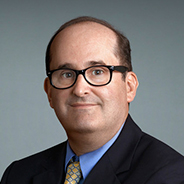
April 5-9 | San Diego & Online

April 5-9 | San Diego & Online
The 2025 Annual Meeting plenary sessions feature leaders in the neurology field presenting the latest and greatest in breakthrough research, controversial issues, and more.
Join us on Saturday, April 5, from 9:15 a.m. to 11:15 a.m. PT, to hear experts dive into the most current and controversial issues in neurology, with experts engaging in a debate format where two speakers argue a side of a single topic, followed by a rebuttal.
 Kathleen Poston, MD, FAAN, Stanford University
Kathleen Poston, MD, FAAN, Stanford University
Yes: Biomarker-based Diagnosis of Parkinson’s Disease: Are We Ready to Adopt a Biological Definition in Research?
 Paolo Calabresi, MD, Policlinico Gemelli
Paolo Calabresi, MD, Policlinico Gemelli
No: Biomarker-based Diagnosis of Parkinson’s Disease: Are We Ready to Adopt a Biological Definition in Research?
 Chitra Venkatasubramanian, MBBS, MD, MSc, FNCS, Stanford University
Chitra Venkatasubramanian, MBBS, MD, MSc, FNCS, Stanford University
Yes: Blood Pressure Targets in ICH: Should We Go Low?
 Kara R. Melmed, MD, NYU Langone Health
Kara R. Melmed, MD, NYU Langone Health
No: Blood Pressure Targets in ICH: Should We Go Low?
 Andrew Charles, MD, UCLA
Andrew Charles, MD, UCLA
Yes: Should CGRP Antagonists Be First Line for Migraine Treatment?
 Elizabeth Loder, MD, MPH, Brigham and Women’s Hospital
Elizabeth Loder, MD, MPH, Brigham and Women’s Hospital
No: Should CGRP Antagonists Be First Line for Migraine Treatment?
Join us on Saturday, April 5, from 4:45 p.m. to 5:45 p.m. PT, to hear highlights of the latest, cutting-edge translational research on key clinical issues, presented by three outstanding speakers. They will summarize their recent research findings and discuss the clinical implications of the results.
 Stephanie R. Miller, PhD, Gladstone Institutes
Stephanie R. Miller, PhD, Gladstone Institutes
AI and Biomarkers for Early Disease Prediction
 Paul Edison, MBBS, PhD, FRCPI, Imperial College London
Paul Edison, MBBS, PhD, FRCPI, Imperial College London
GLP1 Receptor Agonists: A Panacea or Too Good to Be True?
 Leigh R. Hochberg, MD, PhD, FAAN, Massachusetts General Hospital
Leigh R. Hochberg, MD, PhD, FAAN, Massachusetts General Hospital
Implantable Brain-Computer Interfaces for the Restoration of Communication and Mobility
Join us on Sunday, April 6, from 9:15 a.m. to 12:00 p.m. PT, for this session featuring the AAN's premier lecture awards, where leading investigators will present the most significant and clinically relevant neurology research findings of 2025.
 Carlayne E. Jackson, MD, FAAN, University of Texas Health Science Center at San Antonio
Carlayne E. Jackson, MD, FAAN, University of Texas Health Science Center at San Antonio
Presidential Lecture
 Roy H. Hamilton, MD, MS, FAAN, University of Pennsylvania Perelman School of Medicine
Roy H. Hamilton, MD, MS, FAAN, University of Pennsylvania Perelman School of Medicine
H. Houston Merritt Lecture: Rewiring the Mind: Noninvasive Brain Stimulation Approaches to Translational Neurorehabilitation
 Anne M. Connolly, MD, FAAN, Nationwide Children’s Hospital
Anne M. Connolly, MD, FAAN, Nationwide Children’s Hospital
Sidney Carter Award in Child Neurology: Corticosteroids: The First Neuromuscular Treatment Hammer I was Given
 Merit E. Cudkowicz, MD, MSc, FAAN, Massachusetts General Hospital
Merit E. Cudkowicz, MD, MSc, FAAN, Massachusetts General Hospital
AAN Lifetime Achievement Award for Clinically-relevant Research: Fast-Tracking Discovery in ALS: Collaboration, Innovation, and Open Science
Join us on Monday, April 7, from 9:15 a.m. to 11:00 a.m. PT, as we highlight the most critical issues for practicing neurologists, including abstracts related to therapeutic developments, clinical applications of basic and translational research, and innovative technical advancements already impacting the practice of neurology.
 Mary C. Zuniga, MD, University of California, san francisco
Mary C. Zuniga, MD, University of California, san francisco
Presenter: Association Between Non-English Language Preference, Delirium Occurrence, and Inpatient Outcomes
 Nicole Gonzales, MD, University of Colorado
Nicole Gonzales, MD, University of Colorado
Discussant: Association Between Non-English Language Preference, Delirium Occurrence, and Inpatient Outcomes
 Robin van Steenhoven, MD, Erasmus University Medical Center
Robin van Steenhoven, MD, Erasmus University Medical Center
Presenter: Autoimmune Encephalitis Is the Most Common Treatment-Responsive Cause of Rapidly Progressive Dementia: A Large Dutch Prospective Cohort Study
 Stacey L. Clardy, MD, PhD, University of Utah
Stacey L. Clardy, MD, PhD, University of Utah
Discussant: Autoimmune Encephalitis Is the Most Common Treatment-Responsive Cause of Rapidly Progressive Dementia: A Large Dutch Prospective Cohort Study
 Riley Bove, MD, FAAN, University of california, san francisco
Riley Bove, MD, FAAN, University of california, san francisco
Presenter: Placental and Breastmilk Transfer of Ocrelizumab from Women with Multiple Sclerosis to Infants and the Potential Impact on B-Cell Levels: Primary Analysis of the Prospective, Multicenter, Open-label, Phase IV Studies MINORE and SOPRANINO
 Sandra Vukusic, MD, Lyon University Hospital
Sandra Vukusic, MD, Lyon University Hospital
Discussant: Placental and Breastmilk Transfer of Ocrelizumab from Women with Multiple Sclerosis to Infants and the Potential Impact on B-Cell Levels: Primary Analysis of the Prospective, Multicenter, Open-label, Phase IV Studies MINORE and SOPRANINO
 Thomas Khodadad, University of Vermont
Thomas Khodadad, University of Vermont
Presenter: Impact of Rurality on Treatment and Survival in Patients with Brain Metastases
 Antonio M. P. Omuro, MD, FAAN, Stanford University
Antonio M. P. Omuro, MD, FAAN, Stanford University
Discussant: Impact of Rurality on Treatment and Survival in Patients with Brain Metastases
 Isabella Montano, Oregon Health and Science University
Isabella Montano, Oregon Health and Science University
Presenter: Obstructive Sleep Apnea is a Risk Factor for Parkinson’s Disease and CPAP Mitigates Risk of PD: An EHR-based Cohort Study in Military Veterans
 Roneil Malkani, MD, Northwestern University
Roneil Malkani, MD, Northwestern University
Discussant: Obstructive Sleep Apnea is a Risk Factor for Parkinson’s Disease and CPAP Mitigates Risk of PD: An EHR-based Cohort Study in Military Veterans
Join us on Tuesday, April 8, from 9:15 a.m. to 11:30 a.m. PT, as we cover landmark clinical trials that affect patient care in every subspecialty of neurology with investigators presenting the latest clinical trials results that are impacting the landscape of neurological care.
 Andrew S. Feigin, MD, NYU Langone Health
Andrew S. Feigin, MD, NYU Langone Health
The Phase 3 PROOF-HD Trial Demonstrates Meaningful Benefits of Pridopidine on Function, Cognition, and Motor Signs in Huntington Disease (HD)
 Christina Szperka, MD, MSCE, Children’s Hospital of Philadelphia
Christina Szperka, MD, MSCE, Children’s Hospital of Philadelphia
Efficacy and Safety of Fremanezumab for the Preventive Treatment of Episodic Migraine in Children and Adolescents: A Phase 3, Randomized, Double-Blind, Placebo-Controlled Study
 Robert J. Fox, MD, FAAN, Cleveland Clinic
Robert J. Fox, MD, FAAN, Cleveland Clinic
Tolebrutinib Versus Placebo in Non-relapsing Secondary Progressive Multiple Sclerosis: Efficacy and Safety Results from the Phase 3 HERCULES Trial
 Jiwon Oh, MD, FAAN, University of Toronto
Jiwon Oh, MD, FAAN, University of Toronto
Tolebrutinib Versus Teriflunomide in Relapsing Multiple Sclerosis: Efficacy and Safety Results from the Phase 3 GEMINI 1 and 2 Trials
 Richard Nowak, MD, MS, Yale School of Medicine
Richard Nowak, MD, MS, Yale School of Medicine
Phase 3 Myasthenia Gravis Inebilizumab Trial (MINT): Efficacy and Safety Results in Patients with Generalized MG
 Jeffrey A. Allen, MD, University of Minnesota
Jeffrey A. Allen, MD, University of Minnesota
Efficacy and Safety of Targeted Immunotherapy with ANX005 in Treating Guillain-Barré Syndrome: A Phase 3 Multicenter Study
 Michael J. Thorpy, MD, Albert Einstein College of Medicine
Michael J. Thorpy, MD, Albert Einstein College of Medicine
AXS-12 for the Treatment of Narcolepsy: Topline Results from the Phase 3 SYMPHONY Trial
Join us on Wednesday, April 9, from 9:15 a.m. to 11:30 a.m. PT, for this session featuring basic and translational research related to clinical issues of importance with six outstanding speakers summarizing their recent research finding and diving into the clinical implications of the results.
 Nilufer Ertekin-Taner, MD, PhD, FAAN, Mayo Clinic
Nilufer Ertekin-Taner, MD, PhD, FAAN, Mayo Clinic
A Roadmap to Precision Medicine in Neurodegenerative Diseases
 Jerzy Szablowski, PhD, Rice University
Jerzy Szablowski, PhD, Rice University
Bioengineering Tools for Noninvasive Control and Monitoring of the Brain
 Beth A. Malow, MD, MS, FAAN, Vanderbilt University Medical Center
Beth A. Malow, MD, MS, FAAN, Vanderbilt University Medical Center
Impact of Climate Change on Global Brain Health
 William D. Freeman, MD, FAAN, Mayo Clinic
William D. Freeman, MD, FAAN, Mayo Clinic
Precision Medicine in Neurology: Cutting Edge and Emerging Pharmacogenomics for Personalized Neurological Care
 Michel Sadelain, MD, PhD, Columbia University
Michel Sadelain, MD, PhD, Columbia University
CAR-T Therapy
Showcases six speakers focusing on the latest developments of interest to the clinician that have occurred in a specific subspecialty topic. Session details will be available shortly after the live meeting.
 Jennifer A. Vermilion, MD, University of Rochester Medical Center
Jennifer A. Vermilion, MD, University of Rochester Medical Center
Breakthrough Therapies for Pediatric Neurological Disorders
 Sasha Alick-Lindstrom, MD, MPH, FACNS, FAES, FAAN, UT Southwestern Medical Center
Sasha Alick-Lindstrom, MD, MPH, FACNS, FAES, FAAN, UT Southwestern Medical Center
Surgical Treatments for Epilepsy
 Okeanis Vaou, MD, FAAN, UT Health San Antonio
Okeanis Vaou, MD, FAAN, UT Health San Antonio
Updates in the Management of Advanced Parkinson’s Disease
 Karissa Gable, MD, Duke University
Karissa Gable, MD, Duke University
Updates in Myasthenia Gravis
 Ronda Lun, MD, University of Calgary
Ronda Lun, MD, University of Calgary
Thrombectomy for Large Core Ischemic Strokes
 John Winkelman, MD, PhD, Harvard Medical School
John Winkelman, MD, PhD, Harvard Medical School
New Perspectives on Restless Legs Syndrome Management